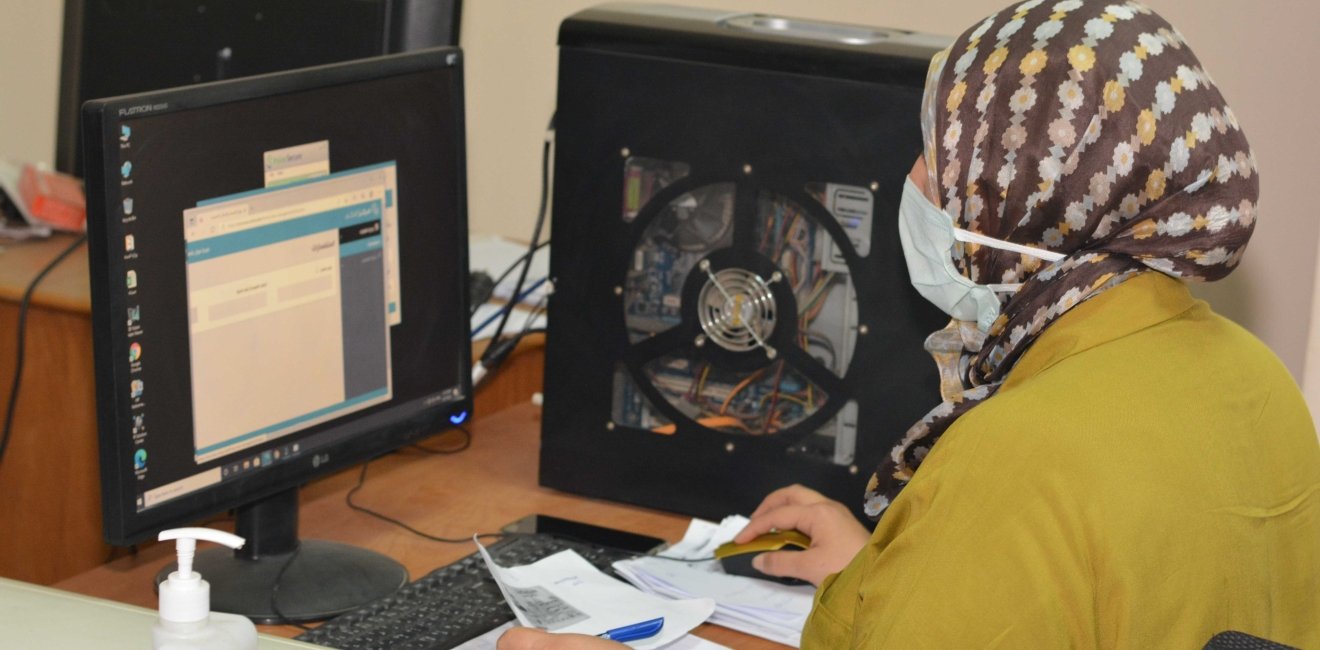
A blog of the Middle East Women's Initiative
The onset of the COVID-19 the pandemic has seen an increase in the burden of unpaid work in the home, which largely falls to women. This includes monitoring the health of elderly family members, childcare, home-schooling, and household chores. For women retaining their jobs throughout the pandemic, these household responsibilities pose a significant challenge, particularly amidst stay-at-home orders.
Unfortunately, though, due to the gendered gap in the labor force, Egyptian women are more exposed than men to job losses, as they are, sadly, easier to lay-off.
Unfortunately, though, due to the gendered gap in the labor force, Egyptian women are more exposed than men to job losses, as they are, sadly, easier to lay-off. The aforementioned caring responsibilities are an added obstacle to women who hope to find employment following lay-offs. What makes this even more alarming is that a large percentage of women in Egypt lack access to social protections, such as social insurance and health insurance.
Another concerning reality in Egypt is female labor represents a disproportionate share of the informal economy, which constitutes about 25 percent of the country’s labor force. These women workers used to be unregistered, therefore lacking essential protections and employment benefits. Given how severely hit the informal sector has been due to COVID-19, the impact on the livelihood of women informal workers is significant.
Further, one cannot disconnect the surge in gender-based violence from the economic hardships that families have faced as a result of COVID-19. Frustrations with financial distress increased the incidence of domestic violence by male abusers. Though critical to control the spread of the pandemic, the precautionary measures taken in the form of lockdowns have increased Egyptian women’s vulnerability to domestic violence. This is yet another challenge for women who seek new job opportunities. Finally, higher rates of illiteracy, particularly in rural areas, and lower access to technology means Egyptian women face greater barriers obtaining information that could aid their job search.
Re-entering the Workforce
The government of Egypt must implement gender-responsive economic policies to enable women to re-enter the workforce. This includes providing support to women with special social status, such as pregnant employees, working mothers, and the disabled, and allowing flexible working hours and exceptional leave to support families. Moreover, psychosocial and social support to those who suffer mental distress can rehabilitate their re-entrance to the workforce. Finally, implementing legal protections to end discriminatory layoffs and raising awareness about these gendered layoffs are essential.
To support all women in Egypt, investing in the care economy... is key to allow women caregivers to go back to work smoothly.
For women entrepreneurs who are affected by the economic impact of the pandemic, measures such as access to logistic facilities and the provision of low-interest loans are a good start to ensure they are empowered to enter the market. Similarly, legalizing the status of labor in the informal sector will grant women access to legal protections and provide them with medical and financial aid to help the most vulnerable women survive the pandemic. To support all women in Egypt, investing in the care economy, including nursing homes for the elderly and day care services for children, is key to allow women caregivers to go back to work smoothly.
These gender-responsive policies must be part and parcel of a broader government effort to address the laws and regulations pertaining to women in the workplace. As these policies are laid out, women must be included in the discussions to ensure all economic recovery plans take women’s interests into account.
Women in Law
As an Egyptian woman working in a legal profession, I witnessed many problems faced by my colleagues in the field. Lawyers are expected to work more hours from home than the norm, a taxing demand in light of the unpaid household duties that women are already responsible for. Also, as reported by colleagues at law firms, women were subject to larger compensation cuts and layoffs because they were viewed as “not sufficiently committed to their careers.”
The silver lining to my work in the legal field is I can report the problems that stem from women litigants’ lack of access to justice. For example, the lockdown of family courts impacted the ability to claim alimony, custody, visitation rights, protection orders, and inheritance rights. E-justice was also very challenging, with digitalized services in Egypt excluding women more than men. The rise in discriminatory practices as a result from the pandemic means now more than ever legal representation for women’s employment rights is imperative.
Author


Middle East Program
The Wilson Center’s Middle East Program serves as a crucial resource for the policymaking community and beyond, providing analyses and research that helps inform US foreign policymaking, stimulates public debate, and expands knowledge about issues in the wider Middle East and North Africa (MENA) region. Read more


Middle East Women's Initiative
The Middle East Women's Initiative (MEWI) promotes the empowerment of women in the region through an open and inclusive dialogue with women leaders from the Middle East and continuous research. Read more

Explore More in Enheduanna
Browse Enheduanna
Women are the Catalysts for Change in Lebanon

How Education Can Empower Young Women in MENA


